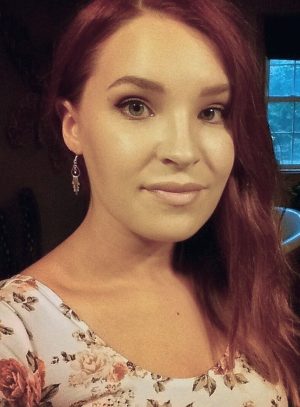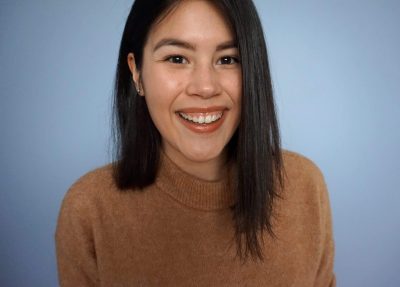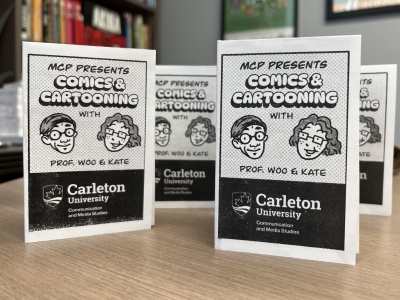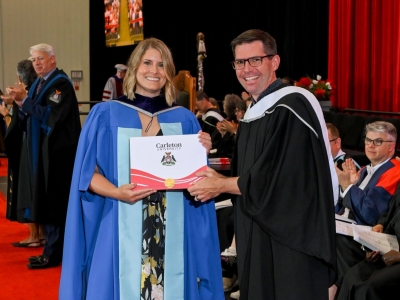Working with international organizations and the federal government is one of the major learning objectives for students enrolled in Open Government and Communication (COMS 4406).
Undergraduate students in Carleton’s Communication and Media Studies program had the opportunity to have their work published last semester as part of the Open Government Partnership Blog Series.
The Open Government Partnership (OGP) is a multilateral initiative that aims to secure concrete commitments from governments to promote transparency, empower citizens, fight corruption, and harness new technologies to strengthen governance. It started with 8 founding countries in 2011 and today includes 75 member countries, including Canada.

Samantha Pitre, fourth-year undergraduate student
“The blog was a way to get students to connect theory with practice,” said Dr. Mary Francoli, who teaches the course. “It also helps to build a community of people who are familiar with openness and open communication, how and who we communicate with, access to information, and the ways that government information is communicated to citizens and citizens are engaged into government processes.”
Fourth-year students Samantha Pitre and Anna Hum took the course last semester and had their blog posts published on the OGP website.
“My post was inspired by a guest lecture we had from Mike Gifford, an advocate for open source who discussed the importance of addressing the biases built into software,” said Samantha. “In seeing numerous stories about the potential net neutrality changes in the United States and the apprehension in response from the public and large media companies, I was interested in finding out more and applying this to a Canadian context to show how abolishing net neutrality would really limit the possibility for an open and collaborative democracy.”
For her blog post, Anna drew inspiration from previous work experience on an information management team in the federal government.

Anna Hum, fourth-year undergraduate student
“I was on a team that was implementing one of the commitments Canada pledged to in the most recent action plan submitted to the Open Government Partnership, to provide enhanced information management and open government skills within the public service,” said Anna. “At the time I didn’t think of it beyond face-value, I was just doing my job and could see the benefits from our work first-hand within the department. However, with this class, I was able to reflect and see the larger picture of how my team’s work was connected to larger government priorities.”
In addition to working with the OGP, students in COMS 4406 also had the unique opportunity to conduct research for the Treasury Board of Canada Secretariat.
The Treasury Board provided the class with five research questions related to open government. Students then worked in groups to devise proposals for how they would approach each questions. After conducting their research and to cap off the semester, the groups trekked to the Treasury Board of Canada Secretariat offices on Elgin St. to present their findings.
“The way the class was organized was unlike any of the other classes I’ve taken during my undergrad,” said Anna Hum. “I think it’s pretty surreal to think that a federal agency may actually be taking my advice on how they proceed with their work considering I haven’t even graduated yet.”
– – –
“Open government is a quickly growing international movement, but it’s not so much embedded in the university curriculum,” said Dr. Francoli. “When we started this class on open government and communication here at Carleton, it was kind of a unique thing.”
A leading researcher in the field of open government and open data, Dr. Francoli started working with the OGP in 2011 and is part of the organization’s international expert panel.

Mary Francoli, Associate Professor
At the most recent OGP international summit, held in Argentina last November, Dr. Francoli delivered a short research talk on how vulnerable populations, including indigenous communities in Canada, have very specific and important needs for access and that are not adequately protected.
“There are a range of issues that are very important to Indigenous communities when it comes to access to information, such as land claims and grievances,” explained Dr. Francoli, “but some of that information can be very hard for people to get.”
Dr. Francoli recounted how Canadian senator Charlie Angus has used access to information requests to uncover how federal policy over the years has harmfully impacted indigenous communities.
“Examples like this highlight how you can learn things by having access to information requests fulfilled,” said Francoli. “So to have indigenous populations looking at new access to information legislation and really vocally saying that they aren’t good is really problematic.”
Dr. Francoli is also conducting research for the Official Language Commission on how and whether bilingualism fits into the open government partnership process in Canada, as well as how language politics play out in other OGP countries who are also officially multilingual.
“Sometimes bilingualism is perceived as an opportunity, other times as a barrier to implementing certain sorts of commitments,” said Francoli,” but it’s also a core part of ensuring there’s greater, open, and more inclusive access to information. Which is why I think bilingualism an important part of the open government discussion that hasn’t really been brought to the table yet.”
Because the emphasis of COMS 4406 is connecting theory with practice. Dr. Francoli is hoping to hold next year’s course in Winter 2019, in order to have the course coincide with an upcoming Ottawa-hosted OGP summit and structure some of the assignments around it.
“As a student in the class, first you do some readings about access to information, or open data or civic engagement, and we talk about the democratic theory behind that,” said Dr. Francoli. “And then you connect all that to a government organization or agency and the students begin to see what some of the barriers are and how some the literature they’ve read plays out in the real world.”
For more information on courses offered through the Communication and Media Studies program, please see the Undergraduate Calendar.
Monday, March 12, 2018 in Communication News, News
Share: Twitter, Facebook



